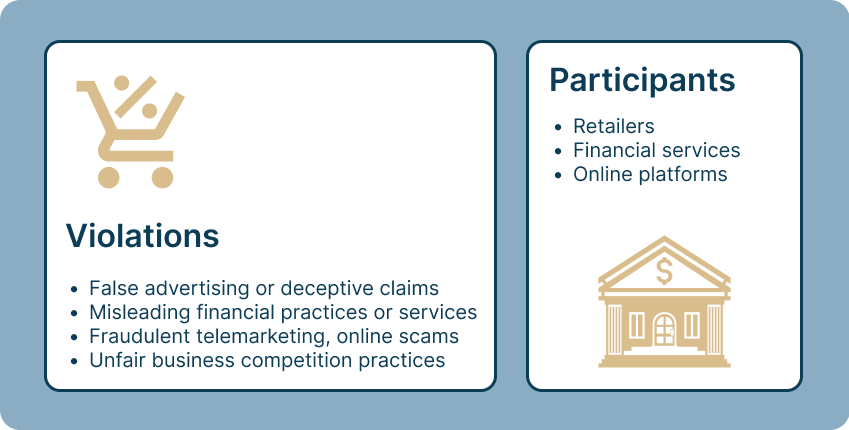What Is It?
FTC (Federal Trade Commission) fraud and violations refer to deceptive, unfair, or fraudulent practices targeting consumers and businesses, or undermine fair competition. The Federal Trade Commission (FTC) enforces rules to protect consumers and the market from such activities. Violations often involve false advertising, misleading business practices, or fraud in financial transactions. Reporting FTC fraud helps protect consumers and maintain ethical business practices.
Organizations Involved
Common perpetrators include retailers, financial services companies, and online platforms. Examples include misleading advertising, false claims about products, and deceptive sales tactics.

Reportable Activities
Key violations include:
- False advertising or deceptive claims
- Misleading financial practices or services
- Fraudulent telemarketing or online scams
- Unfair business competition practices
To report FTC fraud effectively under special whistleblower programs, it's essential to document the fraudulent activity thoroughly and file a complaint with the FTC. However, for complex cases or those involving significant financial harm, turning for help to a whistleblower lawyer can ensure proper guidance. A whistleblower law firm specializing in consumer protection can assist in navigating the legal process, understanding your whistleblower rights, and enhancing the chances of holding wrongdoers accountable. Their expertise can help protect your interests and improve the overall outcome of the case.
Read about Government programs and laws governing FTC fraud here

Please be advised that there are no obligations incurred until we have conducted a comprehensive review and reached a determination regarding the potential for proceeding with your matter.
Submit your case anonymously

 English
English  Español
Español  Русский
Русский  Turkish
Turkish  Persian (فارسی)
Persian (فارسی)  Arabic (العربية)
Arabic (العربية)  简体中文 (中国)
简体中文 (中国)